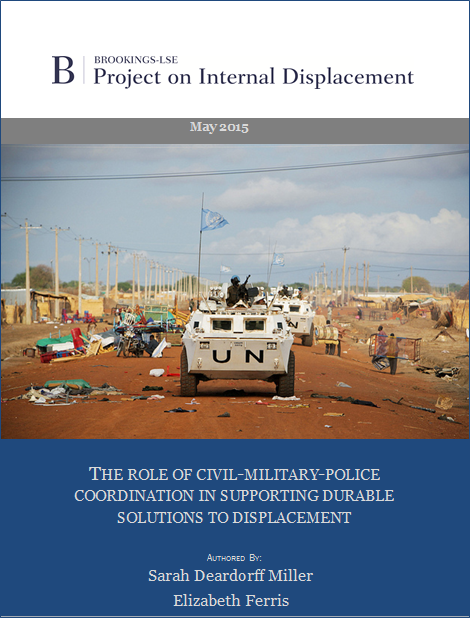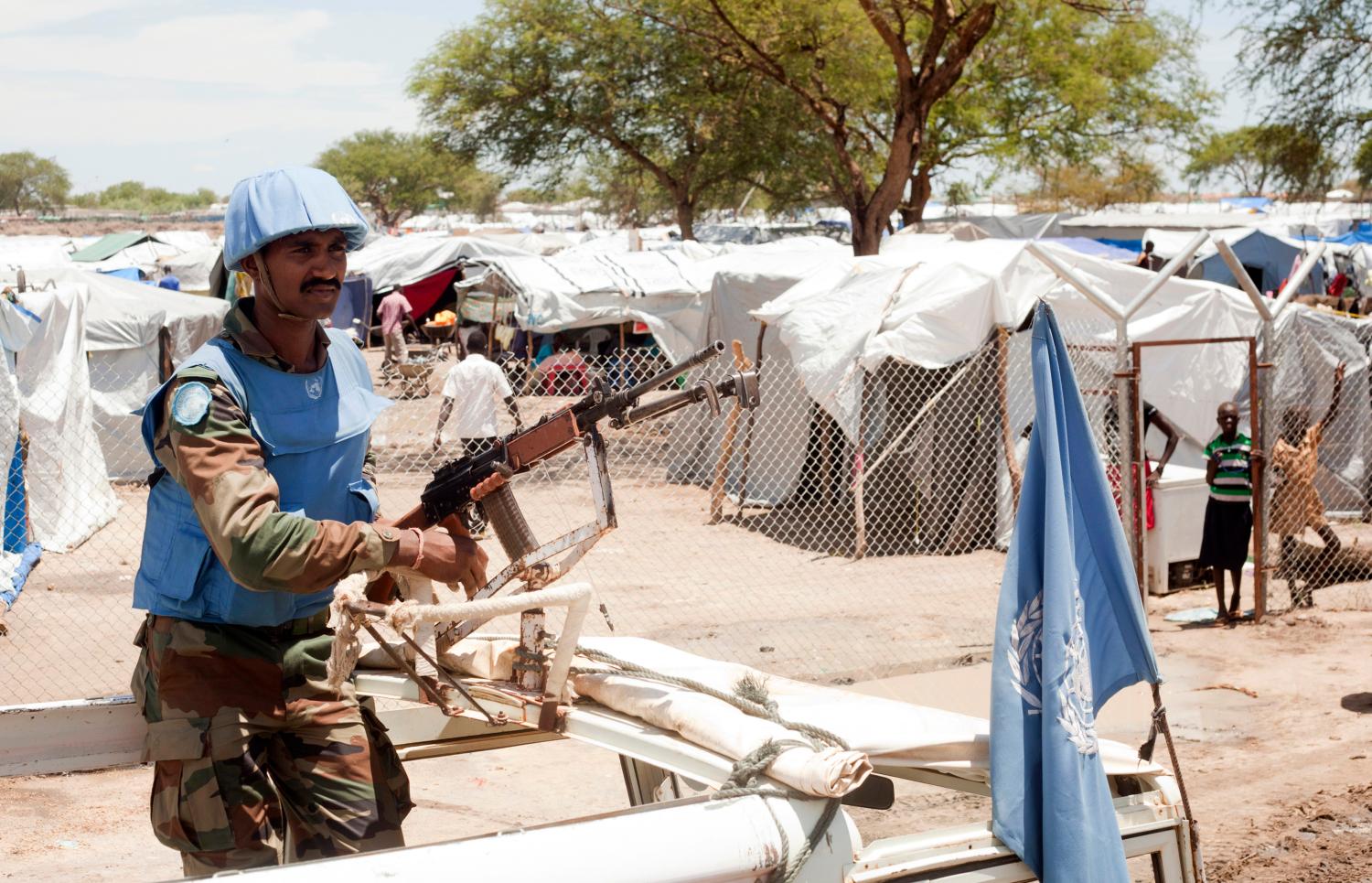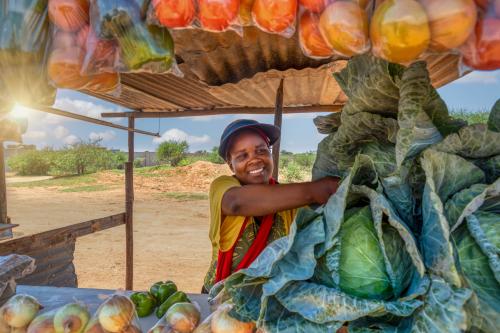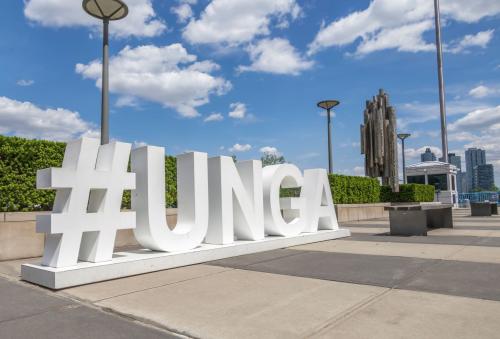 The relationship between displacement and security would appear to be obvious: refugees and internally displaced persons (IDPs) are often displaced because of a lack of security, and cannot find solutions to displacement until security is reestablished, either at their place of origin or new location. In a similar vein, the fact that large numbers of people are displaced can have serious security implications—potentially impeding stability and peacebuilding efforts. Overcoming conflict requires finding durable solutions to those that have been displaced.
The relationship between displacement and security would appear to be obvious: refugees and internally displaced persons (IDPs) are often displaced because of a lack of security, and cannot find solutions to displacement until security is reestablished, either at their place of origin or new location. In a similar vein, the fact that large numbers of people are displaced can have serious security implications—potentially impeding stability and peacebuilding efforts. Overcoming conflict requires finding durable solutions to those that have been displaced.
Actors focusing on durable solutions to displacement and those focusing on security tend to work in isolation from one another.
It is surprising, then, that despite these linkages, actors focusing on durable solutions to displacement and those focusing on security tend to work in isolation from one another. Displacement-focused actors like UNHCR and its partner NGOs certainly recognize the importance of security in finding durable solutions to displacement—indeed, security is the foundation of any durable solution, be it return to the place of origin, local integration into the place of refuge, or settlement elsewhere. And yet they are often unable to bring the displaced into either peacemaking or longer-term peacebuilding processes with security actors.
Likewise security actors, including military, peacekeepers and police forces, do not always recognize the broader peace implications involved with finding durable solutions to displacement. Unresolved displacement issues can lead to any number of security problems. In some cases, refugees or IDPs can be “spoilers” to peace processes, and camps or settlements can harbor rebels or militias that oppose peace. In other cases the mere presence of large numbers of displaced people—often impoverished and living in slums or remote camps without adequate livelihoods, and in some cases lacking freedom of movement—can cause instability. Compounded with other socioeconomic and political pressures, and often living in areas that are already poor and potentially unstable, the presence of the displaced needs to be considered in efforts to secure peace and stability. Sustainable peace can hinge on finding durable solutions to displacement.
The fact that these displacement-focused development/humanitarian actors and security-focused actors have not been able to coordinate more closely is thus a serious issue that relates to some of today’s most challenging conflicts around the world. To that end, there seems to be growing interest in the relationship between ending displacement and peacebuilding, as underscored in several recent initiatives by the UN Secretary-General. Moreover, there is some literature that speaks to this seemingly obvious and yet complex relationship between security actors and durable solutions to displacement. Perhaps the most encouraging has been the recent momentum of global initiatives: the upcoming World Humanitarian Summit; the UN Secretary General’s establishment of the High-Level Independent Panel on Peace Operations to review UN Peacekeeping; the passing of UN Security Council Resolution 2185, which makes policing an essential part of peacekeeping; and the Sustainable Development Goals that emerged from the Rio+20 Conference. These are just a few of the initiatives in the coming year that present new energy and possible opportunities to draw closer linkages between actors working on these complex issues.
The continually unfolding emergency in South Sudan is also raising new issues about the involvement of peacekeepers with IDPs.
Peacekeepers are already mandated to do what they can to create “conditions conducive to the voluntary, safe, dignified and sustainable return of refugees and displaced persons, and to do as much as possible to ensure security in and around refugee and IDP settlements or camps.” And yet the continually unfolding emergency in South Sudan is also raising new issues about the involvement of peacekeepers with IDPs. Since fighting broke out in December 2013, more than 120,000 IDPs have taken refuge at United Nations Mission in the Republic of South Sudan (UNMISS) peacekeeping bases in South Sudan. These bases are not equipped to meet the basic needs of the IDPs who are sheltering there, nor can they offer sufficient protection. IDPs are wary of the peacekeepers and do not see them as neutral. The security and humanitarian situation remains tenuous, and there is concern that if the bases were to be overrun by militias, they might not be able to protect the civilians who have sought protection there or even their own staff and assets. With a mandate to protect civilians, UNMISS forces cannot force the IDPs to leave the bases for areas that are not safe. And yet peacekeeping forces are poorly equipped to manage humanitarian operations.
The case of South Sudan raises fundamental issues of mandates and operations of peacekeeping missions, of training of peacekeeping forces, and questions of equity between those living on UNMISS bases and the 90 percent of IDPs who live elsewhere, in less secure sites. As one participant in the expert workshop said, “Finding solutions for IDPs is UNMISS’ only exit strategy.” Although the particular IDP protection challenges facing UNMISS may turn out to be unique, they do raise broader questions about the relationship between peacekeeping and solutions for displacement.
This report affirms that finding durable solutions for those displaced by the conflict is critical to building sustainable peace in post-conflict situations. It also asserts that closer collaboration and coordination between security and displacement-focused actors is a complex process that requires working across institutional boundaries and sometimes addressing broader political issues. As William O’Neill writes, “…people do not leave their homes, livelihoods, and familiar surroundings for trivial reasons. Ensuring that the state institutions charged with providing security and order to groups forcibly displaced inevitably requires changes in political systems and the distribution of power so that displacement does not recur.
This report synthesizes relevant background literature, shares findings from a workshop on this and case study reports, and outlines recommendations for moving forward.
The Brookings Institution is committed to quality, independence, and impact.
We are supported by a diverse array of funders. In line with our values and policies, each Brookings publication represents the sole views of its author(s).




